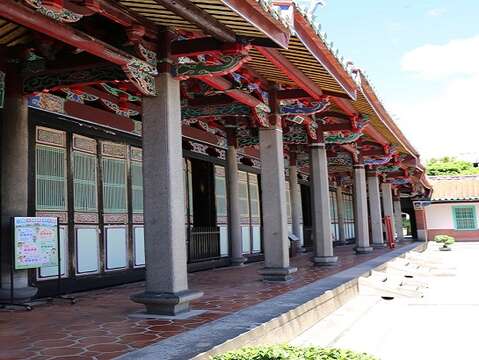【2020 Intern Travel Diary】One Day Trip to Explore Ancient Temples
Explore local customs through hundred-year temples
~WORDS & PHOTOS:Taipei American School~
~ Ian Ho(何丞)and Duolong Yang(楊道隆)~
Themed Itineraries : Religion, Temples, Local Culture
Travel days : 1 Day
【 Introduction 】
Wanhua Temple Cluster:
The Wanhua area is one of the oldest areas in Taipei, where many immigrants initially settled when they first came hundreds of years ago, making the temples in the area not only the most historically rich, but also the most active centers in Taipei. Big Three is used often to describe these temples because of their significance, though Qingshan temple has been excluded due to travel inconvenience. Qingshan temple is still highly recommended for those willing to walk.
【 Lungshan Temple 】
No. 211, Guangzhou Street, Wanhua District, Taipei City, 10853
6:00 ~ 22:00
Built in 1738, Lungshan temple had been designated as a Secondary National Heritage Site for its mosaic, carving, and other decorations that represent some of the best in Taiwan. The layout of the temple represents both a Siheyuan structure common in traditional Chinese housing and palace structures. The temple houses both Buddhist and Taoist deities.
Nearby
- Bopiliao Historical Blockb
- Guangzhou Street Night Marke
- Shintomicho Cultural Market
No. 81, Kangding Road, Wanhua District, Taipei City, 108
Open All Hours
Built in 1787, Qingshui Temple worships Master Qingshui, a Buddhist monk who was known for his magical abilities. The temple also holds a Qing dynasty plaque gifted by the Emperor Guang Xu in addition to other items that have been preserved since the Qing dynasty.
Nearby:
Bangka Old Street
Nishi Honganji Relics
No. 51, Chengdu Road, Wanhua District, Taipei City, 10844
6:00 ~ 22:00
Tianhou is also known as Mazu, the goddess that oversees the ocean. Since early Taiwanese society revolved greatly around fishing, Mazu was one of the most important goddesses. In 1948 the Mazu figure was moved to a temple built during the Japanese colonial era that also worships Monk Kukai. Since 1973, the Kongobuji branch in Tokyo has been sending monks to perform ceremonies at the temple.
Nearby:
The Red House
Eslite Spectrum Ximen Store
No. 61, Section 1, Dihua St, Datong District, Taipei City, 103
6:16 ~ 19:47
Xiahai City God Temple originally came from Quanzhou. Though it is neither the largest nor the oldest temple, it still managed to preserve its original layout since the Qing dynasty. Just like Lungshan temple, it is actively involved with the local community and is a renowned temple for praying to the old man under the moon. Dihua street, where the temple is located, is an old market area with many interesting stores and new shops that revitalize the historical buildings. Dihua street alone can be a whole afternoon’s worth of exploration.
Nearby:
Dihua Street
Chen Tian-lai Residence
8:00 ~ 17:00
A Buddhist temple that can be found in Zhongshan District of Taipei, it was constructed by the Japanese monk, Meishan De'an. The original Japanese styled temple serves as a remembrance of Taiwan’s colonial history, while many additional buildings were constructed. The key feature of the temple, the Mahavira Hall was modeled after the building style of the Song dynasty.
Nearby:
Xinsheng Park Area of Taipei Expo Park
Yuanshan Archaeological Site
Taipei City Art Museum
No. 275, Dalong Street, Datong District, Taipei City, 103
8:30 ~ 21:00
Molded after the original Confucius Temple in Qufu, Shandong, this is Taipei’s only temple adorned with southern Fujian-style ceramic. In the main hall, a black plaque with gold letter written by Chiang Kai-shek says, “Educate without discrimination.” This temple also features a 4D theater entailing the journey of Confucious and the history of the temple in addition to other exhibitions. This temple is most notably a place where students come with their parents when seeking luck and blessings on academics. The large annual ceremony for commemorating Confucius is also held here, an event that many important government officials attend.
Nearby:
Black Tea Drink House
No. 61, Hami Street, Datong District, Taipei City, 103
6:30 ~ 21:30
A temple built in Datong District, it was originally built by clan members of Tong'an, Xiamen, Fujian. Early construction started in 1804 and throughout the 20th century it went through several improvements and remodels. In 2003, the temple got the UNESCO Asia-Pacific Heritage Award for Culture Heritage Conservation Honorable Mention, the first to get the award in Taiwan. People often pray to Baosheng Dadi, the main god of the temple, for good health. The temple often hosts ceremonies, festivals, and plays with many local participants.
Nearby:
Dalong Street Night Market
- To get to Lungshan Temple, walk via Exit 1 of Lungshan Temple MRT Station
- Qingshui Temple:
Lungshan Temple Bus Station → Zushi Temple (Kangding) Bus Station via 264, 205, 701, Chongqing Main Line, 9, 234 - Tianhou Temple:
Zushi Temple (Guiyang) Bus Station → Guiyang Street Bus Station via 232, 205, 9 - Xiahai City God Temple
MRT Ximen Station → MRT Beimen Station Exit 2 → Beimen Bus Station → Yanping Changan Rd. Intersection Bus Station via 223 or 206 - Remaining Three Temples:
Beimen MRT Station or Bus station → Yuan Shan MRT or Bus Station
* Chongqing Main Line connects all the bus stations except for a transfer needed at Minzu Chongqing Rd. Intersection station when heading from Beimen to Yuanshan. The recommended route does not include all options. Additional bus option or travel option please refer to google map or other navigation applications. Walking is possible









